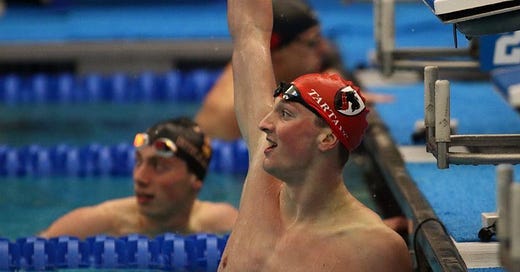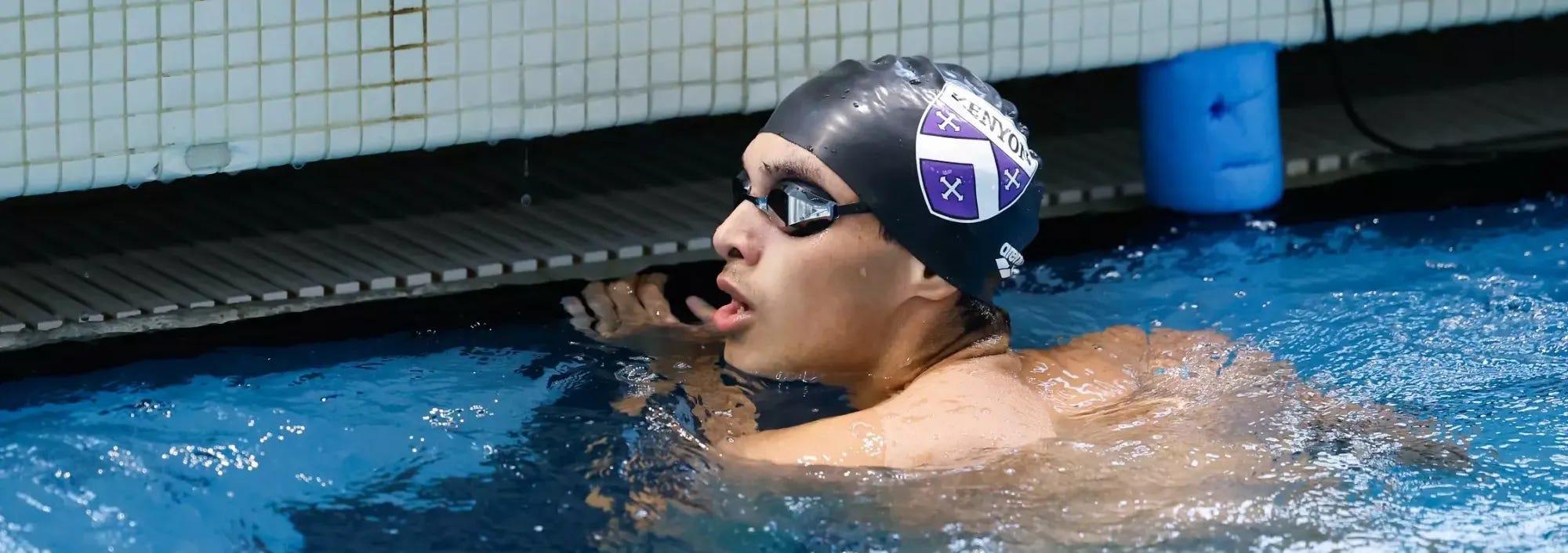The Widening Gyre
The next wave of invitationals shake up the leaderboards and shine a spotlight on a new D3 superstar.
We’re holding off on releasing the SRS team totals until the action in Chicago wraps up, as those results will undoubtedly impact overall rankings. Why are we so confident? Just look at the first individual event of the meet, the Women’s 500 Free. Seven NYU women swam faster than last season’s invite time of 4:58.57. Seven. (Thanks for the heads-up, Ed) So, releasing the rankings before we get the Chicago results might be a little…premature.
What we can be sure of, right now
Kenyon has surpassed Emory on the women’s SRS tables, with 40 points compared to Emory’s 31.52. While totals for the Violets aren’t in yet, it’s possible NYU could take the lead.
On the men’s side, Emory has also lost its #1 spot. Carnegie Mellon now leads with 26.60 SRS points, over half of which were contributed by sophomore Brayden Morford, the current leader in individual SRS points. Totals from other men’s teams may not be available until Monday.1
These rankings will shift in the coming weeks as Emory competes at the Denison Invitational, NYU and JHU race at TCNJ, and other teams compete through early December.
Brayden Morford and the 13 Tartans
We will let the tables tell the story.
The 100 Fly time of 46.44 is, by SRS, the top-ranked swim in a men’s event this season. Notably, the all-time Division III record stands at 46.28.
Easily overlooked in the excitement of Mr. Morford’s performance is this: thirteen other Carnegie Mellon athletes generated positive SRS points in men’s events this weekend. Depth matters, and the Tartans are now tied with Emory for the most athletes contributing positive SRS points in men’s events (14 each).
Ladies First
Kenyon currently has three athletes competing in women’s events with cumulative SRS totals over 7 points. The rest of Division III has none (though this may change with more invitational results expected tonight and tomorrow).
Jennah Fadely holds the highest SRS swim of the season—her 1:00.16 in the 100 Breast leads all athletes, men and women, in all events with an SRS value of 3.38. After the race, a competitor admiringly quipped, "Jennah is a cheat code."2
More bad news for Kenyon's opponents comes in the form of Gabby Wei, last year’s national champion in the 200 Breast, who is so far generating slightly more SRS value than Ms. Fadely. Meanwhile, Bengisu Caymaz continues to swim every event at what seems like 200 Free pace, even in the 500 Free or the mile.
Kenyon junior Molly Haag and senior Sydney Geboy are contributing major points, along with first-years Kelsey Van Eldik and Nora Lee Brown.
While Emory’s depth remains a standout, with 20 Eagles generating SRS points in women’s events, Kenyon is closing the gap, with 16 Ladies now earning positive SRS points.
Lords, Old and New
Take a look at this table again.
Last week, we questioned whether the Kenyon Lords had lost too much talent to remain serious contenders. This weekend's results suggest otherwise. Djordje Dragojlovich is still a perennial swimmer-of-the-year candidate, and his teammates are delivering pleasant surprises. Ethan Manske, Noel Tumbasz, and Roman Savage, all part of last year’s Nationals team, continue to improve this season. Division II transfer Kirill Sidorko is exceeding expectations. First-year Charlie Green, sophomore Peter Dunson, and junior Teo Jaworski are generating positive SRS points. Depth issues may remain, but there’s still time for others to secure spots on the Nationals team.
Sophomore Roman Savage deserves special mention. This weekend, he qualified for the A Final in the 100 Fly, 500 Free, and 1650 (he scratched the 200 Fly after qualifying). He swam fly in Kenyon’s A Medley Relays, repeatedly facing the toughest task of the weekend—keeping pace with Brayden Morford. Mr. Savage even gave Mr. Morford his only real scare, in a 100 Fly final decided by less than 1/10th of a second. He also anchored Kenyon’s first-place 800 Free relay.
Case Western
Case Western now has two athletes above the 2.00 SRS point threshold: Peter Meng and John Drumm. Senior Peter Meng, who set the Case Western record in the 400 IM at Nationals last season, is an unusually versatile swimmer, reliably making championship finals in events ranging from the 200 IM to the 1650 Free. He also stands out as someone who actually enjoys swimming. Now in his senior year, we are hopeful he continues to get enjoyment from his unusual ability to excel across a broad range of events.
Junior John Drumm repeated as the 200 Fly champion at the Kenyon Invitational, improving his 2023 winning time by about 0.75 seconds. We rank Mr. Drumm’s 200 Fly as the seventh most valuable swim in men’s Division III this season, trailing only Kirill Sidorko’s 400 IM, Roman Savage’s 100 Fly, and…like, four swims by Brayden Morford.
Case Western is making its mark on both the men’s and women’s SRS tables. Fly standout Claire Kozma and freestyle sprinter Gaby Chambers delivered swims totaling nearly 3 SRS points. On the men’s side, joining Mr. Meng and Mr. Drumm is Mason Bencurik, who has been highly productive in the 100 and 200 Free.
News and Notes
Hope College will appear on both the men’s and women’s SRS tables this week. Sara Kraus’ 200 Back ranks as the 10th best swim in women’s events this season, and we have Ms. Kraus ranked 7th overall in women’s events in total SRS.
NESCAC rules prevent those teams from starting proper training until long after the rest of Division III is in full swing. It generally takes elite swimmers in the NESCAC until around February to get into top gear. Generally, except for Sophia Verkleeren. Considering she started competing (literally) last week, it is worth noting that she already has three swims worth more than one SRS point each. Overall, we rank her as the 8th most valuable swimmer in women’s Division III.
We’re sure we’ve missed something important, but another post tomorrow will give us a chance to make up for it.
Anticipating some questions on team SRS team total calculations:
An athlete’s contribution to team SRS is limited to the SRS value of their fastest swim in a particular event. If Kaley McIntyre has four 50 Free swims that generated positive SRS points, only her fastest 50 Free swim counts towards NYU’s total.
There are currently no limits to the number of events in which an athlete can contribute SRS points. So, Brayden Morford is right now contributing positive SRS points to his team in seven different events.
Obviously, when we do projections for championship meets, we will need to limit each athlete to the appropriate number of individual events.
For instance, at Nationals an athlete can only swim in three individual events. So in calculating team SRS totals ahead of Nationals, we would limit each athlete to contributions from their three strongest events, but no more than three.
We do not count negative SRS points against team totals. Only positive SRS scores are included in the team totals.
In case you are not a gamer or are just of the wrong-generation to understand that comment, this was not an accusation of cheating. A cheat code is a special set of instructions entered into a video game that lets you do things that wouldn’t normally be allowed. It’s like a secret password or trick that can make the game easier or make your character/side more powerful. For example, it might give you extra lives, make you invincible, or unlock hidden levels. Think of it like a shortcut that lets you bend the rules of the game.











Based on what we’ve seen from Emory this far we’ll be right back where we started once the Denison invitational is over.
This will be a fun season! Thank you for covering D3 swimming, too many swimmers overlook it because it's not "D1."